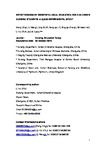Effectiveness of empathy clinical education for children’s nursing students: A quasi-experimental study
| dc.contributor.author | Ding, X | |
| dc.contributor.author | Wang, L | |
| dc.contributor.author | Sun, J | |
| dc.contributor.author | Li, D-Y | |
| dc.contributor.author | Zheng, B-Y | |
| dc.contributor.author | He, S-W | |
| dc.contributor.author | Zhu, L-H | |
| dc.contributor.author | Latour, Jos M | |
| dc.date.accessioned | 2019-10-30T10:59:11Z | |
| dc.date.issued | 2020-02 | |
| dc.identifier.issn | 0260-6917 | |
| dc.identifier.issn | 1532-2793 | |
| dc.identifier.other | 104260 | |
| dc.identifier.uri | http://hdl.handle.net/10026.1/15090 | |
| dc.description.abstract |
BACKGROUND: Empathy is a central competence for nursing students in delivering compassionate care. Empathy training might improve the communication skills in children's nursing students. OBJECTIVES: To evaluate the effectiveness of the Knowledge, Simulation, and Sharing training programme on empathy skills among children's nursing students. DESIGN: A controlled pre-post intervention study with a quasi-experimental design. SETTING: Tertiary children's hospital in China. PARTICIPANTS: Children's nursing students (n = 250) in clinical internship. METHODS: A Knowledge, Simulation, and Sharing (KSS) module related to empathy learning was developed and tested during a 10-month period in 2017. Nursing students were divided into an experimental group (n = 125) and control group (n = 125). Both groups received the standard internship programme. The experimental group received the KSS training. Outcome measures were: Jefferson Scale of Empathy-Health Professions Student, Clinical Communication Competence Scale and Professional Identity Scale. RESULTS: At the end of the internship the experimental groups had significantly higher empathy scores than the control group (114.57 versus 110.36; p = .016). The communication skills improved significantly in the experimental group after the training; experimental group mean 90.22 versus control group mean 87.41 (p = .042). The professional identity scores were significantly higher in the experimental group at the end of the internship compared to the control group (mean 116.43 versus 107.68; p < .001). Subgroup analysis revealed only significant differences on professional identity outcomes between experimental and control groups on diploma level (mean 115.78 versus 107.72; p < .001); and bachelor's level (mean 120.05 versus 108.00; p < .016). CONCLUSION: The KSS training can enhance empathy and communication skills and the professional identity in children's nursing students. Further long-term effectiveness of the training needs to be tested, ideally with reported outcomes measures of children and parents. | |
| dc.format.extent | 104260-104260 | |
| dc.format.medium | Print-Electronic | |
| dc.language | en | |
| dc.language.iso | en | |
| dc.publisher | Elsevier | |
| dc.subject | Empathy | |
| dc.subject | Paediatric nursing | |
| dc.subject | Nurses | |
| dc.subject | Students | |
| dc.subject | Communication | |
| dc.subject | Knowledge | |
| dc.subject | Simulation training | |
| dc.subject | Education | |
| dc.title | Effectiveness of empathy clinical education for children’s nursing students: A quasi-experimental study | |
| dc.type | journal-article | |
| dc.type | Journal Article | |
| plymouth.author-url | https://www.webofscience.com/api/gateway?GWVersion=2&SrcApp=PARTNER_APP&SrcAuth=LinksAMR&KeyUT=WOS:000513989200018&DestLinkType=FullRecord&DestApp=ALL_WOS&UsrCustomerID=11bb513d99f797142bcfeffcc58ea008 | |
| plymouth.volume | 85 | |
| plymouth.publication-status | Published | |
| plymouth.journal | Nurse Education Today | |
| dc.identifier.doi | 10.1016/j.nedt.2019.104260 | |
| plymouth.organisational-group | /Plymouth | |
| plymouth.organisational-group | /Plymouth/Faculty of Health | |
| plymouth.organisational-group | /Plymouth/Faculty of Health/School of Nursing and Midwifery | |
| plymouth.organisational-group | /Plymouth/REF 2021 Researchers by UoA | |
| plymouth.organisational-group | /Plymouth/REF 2021 Researchers by UoA/UoA03 Allied Health Professions, Dentistry, Nursing and Pharmacy | |
| plymouth.organisational-group | /Plymouth/Research Groups | |
| plymouth.organisational-group | /Plymouth/Research Groups/Institute of Health and Community | |
| plymouth.organisational-group | /Plymouth/Research Groups/Plymouth Institute of Health and Care Research (PIHR) | |
| plymouth.organisational-group | /Plymouth/Users by role | |
| plymouth.organisational-group | /Plymouth/Users by role/Academics | |
| dc.publisher.place | Scotland | |
| dcterms.dateAccepted | 2019-10-29 | |
| dc.rights.embargodate | 2020-11-5 | |
| dc.identifier.eissn | 1532-2793 | |
| dc.rights.embargoperiod | Not known | |
| rioxxterms.versionofrecord | 10.1016/j.nedt.2019.104260 | |
| rioxxterms.licenseref.uri | http://www.rioxx.net/licenses/all-rights-reserved | |
| rioxxterms.licenseref.startdate | 2020-02 | |
| rioxxterms.type | Journal Article/Review |


